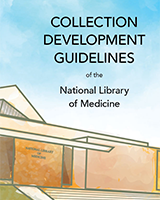NCBI Bookshelf. A service of the National Library of Medicine, National Institutes of Health.
Collection Development Guidelines of the National Library of Medicine [Internet]. Bethesda (MD): National Library of Medicine (US); 2019-.

Collection Development Guidelines of the National Library of Medicine [Internet].
Show detailsDefinition
Toxicology is the study of the adverse effects of chemical, physical and biological agents on living organisms and the ecosystem.
Discussion
Toxicology studies the agents responsible for adverse effects, the mechanisms involved, the damage that may ensue, testing methodologies to determine the extent of damage, and ways to avoid or repair it. Toxicology is traditionally associated with chemical exposures, such as the effects of drugs, industrial chemicals, pesticides, food additives, household products, and personal care items. Toxinology, a subdiscipline of toxicology, studies biological exposures, such as insect stings, poisonous mushrooms and plants, venomous snakes and aquatic life. The third category of toxicology is concerned with physical hazards, such as radiation and noise.
Test methodology for determining the toxicity or safety of chemicals is an important emphasis of toxicology. With increased attention to alternatives to whole animal testing, important tools in toxicology include in vivo and in vitro methods, analysis of structure-activity relationships, modeling and computational toxicology.
Scope and emphasis
NLM collects all aspects of toxicology involving human health and works of potential application to biomedical research such as studies on the biochemical and molecular basis of toxicity. The collection places special emphasis on emerging disciplines, such as toxicogenomics and toxicoproteomics, and topics of public health concern, such as endocrine disruptors and the toxicology of chemical and other disasters.
Because of the relevance of extrapolating animal study results to humans, toxicological assays involving both traditional laboratory animals and wildlife are collected. In the area of food toxicology, NLM collects toxicological studies on plants in the human food chain and works on nutritional toxicology of potential interest to researchers in biomedicine and public health, but generally excludes works primarily intended for agricultural or food industry research. The Library collects works on environmental pollution and ecotoxicology if they have biomedical application or public health content, but otherwise does not collect in the area of ecotoxicology.
Special considerations
Technical reports, criteria documents, and standards are important publication types in toxicology. The focus of the NLM collection is on documents of U.S. and global interest.
- Toxicology - Collection Development Guidelines of the National Library of Medici...Toxicology - Collection Development Guidelines of the National Library of Medicine
- Enterobacter hormaechei strain KPC4_1, whole genome shotgun sequencing projectEnterobacter hormaechei strain KPC4_1, whole genome shotgun sequencing projectgi|1321459925|gb|MRBC00000000.1|MRB 0000Nucleotide
- Pathology - Collection Development Guidelines of the National Library of Medicin...Pathology - Collection Development Guidelines of the National Library of Medicine
- Oncology - Collection Development Guidelines of the National Library of MedicineOncology - Collection Development Guidelines of the National Library of Medicine
- Medicine - Collection Development Guidelines of the National Library of MedicineMedicine - Collection Development Guidelines of the National Library of Medicine
Your browsing activity is empty.
Activity recording is turned off.
See more...